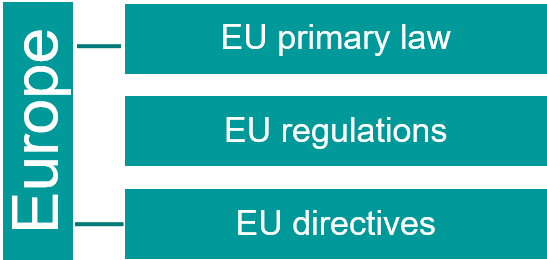That's what it's all about! Europe today - the status quo
Hand on heart: Do you know the European legal order? Do you know that EU law can be directly invoked and enforced before the courts of the EU Member States (it has "direct effect") and that laws of the EU Member States are considered invalid if they are incompatible with EU law (principle of "primacy of the higher-ranking norm"). Source: Europäisches Justizportal - EU-Recht (europa.eu)
European legal order:
The EU sees itself as a supranational legal community based on several legal foundations: The most important legal foundation is the so-called primary law or EU primary law as a kind of constitution. It is negotiated directly between the governments of the member states and is anchored in the European treaties. These treaties can only be amended if all member states agree to the amendment or if the governments unanimously decide to do so and the national parliaments ratify it. In order to create laws and regulations, the Community legislator always needs a special authorisation, which can be found in the EU Treaties. |
 |
Back to the initial question:
Only very few citizens are familiar with the European legal order and its mechanisms of action.
And this despite the fact that
- both primary and secondary EU law create certain individual rights which the state courts have to respect
- and European Community law takes priority over national law, even constitutional law.
The fact that it is almost impossible to revise EU regulations once they have been adopted, and that the machinery of regulation rolls inexorably forward, requires much better parliamentary control and critical monitoring at the European level and not only at different national levels. A summary of more of 2000 of the EU legislation can be found here: Summaries of EU legislation - EUR-Lex (europa.eu)
Once you have realised how deeply European legislation has already penetrated and influenced our lives at almost all levels, then you too will be convinced that national solo efforts cannot stand a long-term chance in the EU structure.
On the other hand, the EU will not stand a chance either if it does not adequately involve the different national interests in the decision-making process.
In view of the current state of the world, we must put Europeanisation instead of globalisation on our agenda. The approximately 450 million inhabitants of the European Union only have a future and a chance not to go down in the competition of the big ones together.
Globalisation was yesterday - let's concentrate on Europeanisation!


